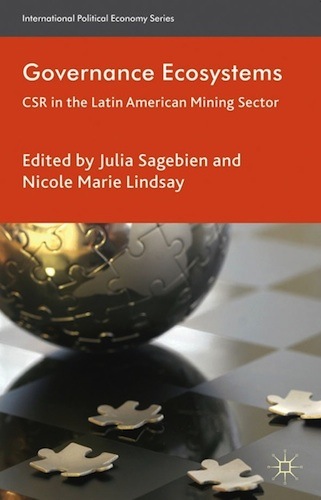In January of this year, efforts by the Canadian government and the mining industry to promote and support mining as a core element of international development suddenly became the focus of intense and prolonged media scrutiny, opening up to broader public scrutiny an issue that MiningWatch Canada has been researching and writing on.
An article by the Ottawa Citizen’s Elizabeth Payne (“What is going on at CIDA?”) on January 19 started the debate off. Payne noted “[s]omething is rotten at the Canadian International Development Agency. Many things, in fact, according to increasingly vocal critics who say Canada’s international development organization is becoming more politicized, less effective, and less transparent under the Conservative government, despite persistent claims to the contrary.”
Payne turned her attention specifically to CIDA support for Corporate Social Responsibility (CSR) projects of major – and profitable – Canadian mining companies Rio Tinto Alcan, Barrick Gold, and IAMGOLD, in partnership with major Canadian development non-governmental organizations (NGOs): respectively, World University Service of Canada, World Vision Canada and Plan Canada. Overall, CIDA’s support for these projects ($9,528,000) far exceeds the combined contributions by the mining companies and the NGOs involved ($2,828,000), amounting to a taxpayer funded subsidy of corporate social programs.
The Mining Association of Canada, the Prospectors and Developers Association of Canada, and the development NGOs involved defended their partnerships in editorials and in responses to the media, and coverage spread from the Ottawa Citizen to the Globe and Mail, Embassy Magazine, CBC’s The Current and As It Happens, among others. Readers provided lively responses and the issue was also extensively covered in blogs and on social media. Writing in Embassy Magazine, MiningWatch Canada provided background information on the creation of the Devonshire Initiative in 2009, a network of Canadian development NGOs and major mining companies. MiningWatch also raised particular concern about the use of official development assistance funds to subsidize corporate CSR projects and noted the dubious consequences of partnerships between development NGOs and mining companies, among them, the tendency for NGOs to take on the task of publicly defending the reputations of their corporate partners.
For these “Devonshire Initiative” NGOs, collaborations with mining companies allow them to “diversify funds” – and leverage additional CIDA funds as well as political goodwill - but the costs are high: the ethics of the development NGOs and their mining partners become inexorably entwined. In an opinion piece in the Globe and Mail on January 31, top executives of World Vision, World University Service of Canada, and Plan Canada defended their partnerships with mining companies, advancing the industry’s own message that mining companies are “already significant development actors in their own right.” Rosemary McCarney of Plan Canada found herself vouching for the high ethical standards of partner IAMGOLD on CBC’s The Current (Jan. 26), pronouncing that Plan does an “extraordinary amount of due diligence ... on the ethical standards” of companies with which it collaborates. This confidence in the positive development impacts and ethical behaviour of partner mining companies was subsequently called into question in a February letter from Miguel Palacín of the Andean Coordinating Committee of Indigenous Organizations to the Minister of International Cooperation, Bev Oda, in which he highlighted local opposition to the pilot project with World Vision and Barrick in Peru. (See the letter and additional information regarding conflict and opposition at this mine site).
The debate over mining and development also features strongly in ongoing parliamentary hearings of the House of Commons Standing Committee on Foreign Affairs and International Development under the heading Study on the Role of the Private Sector in Achieving Canada’s International Development Interests. MiningWatch provided a brief and is on the list of witnesses for a future session.
There is more to come. In October 2011, the Government of Canada announced the creation of a “Canadian International Institute for Extractive Industries and Development” to be housed at a Canadian university. The institute is meant to support and build natural resource management capacity in developing countries. Federal funding is expected to be in the range of $25 million. Canadian universities will bid to host the institute.
Academic institutions are also picking up the theme. In March 2012, McGill University’s Institute for the Study of International Development hosted a conference entitled Public-Private Partnerships for Sustainable Development: Towards a Framework for Resource Extraction Industries.
Given the controversy over the role of public funding for CSR projects and mining company-NGO partnerships, the Canadian Council for International Co-operation (CCIC) hosted an initial by-invitation-only dialogue on May 22. Twenty people from 14 NGOs met to clarify differing perspectives and search for common ground. MiningWatch participated in this session. It is anticipated that there will be further meetings, focusing on different aspects of the debate.
Some important points of communality that were identified at the meeting include:
- Recognition of the often poor track record on environmental, social and human rights fronts of Canada’s extractive industry;
- The need for strengthening the legislative, regulatory, economic and social frameworks of developing countries, as well as some form of regulatory mechanism within Canada so that Canadian mining companies working abroad can be held accountable for their practices;
- Concern over the current government’s position linking Canadian commercial interests with development interests in the South.
A full report of the meeting will be available later in June; meanwhile a one-page summary can be found here.
